Secretary of State for Health and Social Care
The Secretary of State for Health and Social Care is a senior minister of the Crown within the Government of the United Kingdom, and leads the Department of Health and Social Care (DHSC), with responsibility for England's National Health Service (NHS). The office forms part of the British Cabinet.
| Secretary of State for Health and Social Care | |
|---|---|
.svg.png.webp) | |
| Department of Health and Social Care | |
| Style | Mr. Secretary (informal) The Right Honourable (UK and the Commonwealth) |
| Status | Minister of the Crown |
| Member of | Cabinet Privy Council |
| Reports to | Prime Minister of the United Kingdom |
| Appointer | The Crown on advice of the Prime Minister |
| Term length | At Her Majesty's pleasure |
| Formation | 14 October 1854 |
| First holder | Sir Benjamin Hall |
| Salary | £143,552 (including salary as MP) |
| Website | www |
| This article is part of a series on |
| Politics of the United Kingdom |
|---|
.svg.png.webp) |
|
|
The current Secretary of State for Health and Social Care is Matt Hancock MP, since his appointment by then–Prime Minister Theresa May, in July 2018. Mr Hancock retained his position upon the elevation of Boris Johnson to Prime Minister.
The Secretary has two principle deputies:[1] the Minister of State for Health and the Minister of State for Social Care.[2]
Responsibilities
Corresponding to what is generally known as a health minister in many other countries, the health secretary's remit includes:
- Oversight of England's National Health Service, including:
- Delivery of care
- Performance
- Financial management[3]
- Matters concerning England's social care policy
- Matters concerning England's national public health
- Relations with international health partnerships (WHO)
History
Since devolution in 1999, the position holder's responsibility for the NHS is mainly restricted to the health service in England, with the holder's counterparts in Scotland and Wales responsible for the NHS in Scotland and Wales. Prior to devolution, the secretaries of state for Scotland and Wales had those respective responsibilities, but the Department of Health had a larger role than now in the co-ordination of health policy across Great Britain. Health services in Northern Ireland have always had separate arrangements from the rest of the UK, and are currently the responsibility of the health minister in the Northern Ireland Executive.
The first Boards of Health were created by Orders in Council dated 21 June, 14 November and 21 November 1831. In 1848, a General Board of Health was created with the first commissioner of woods and forests as its president. In 1854, this board was reconstituted and the president appointed separately. However, the board was abolished in 1858 and its function of overseeing the local boards was transferred to a new Local Government Act Office within the Home Office. From 1871, that function was transferred to the new Local Government Board.
The Ministry of Health was created in 1919 as a reconstruction of the Local Government Board. Local government functions were eventually transferred to the Minister of Housing and Local Government, leaving the Health Ministry in charge of Health proper.
From 1968, it was amalgamated with the Ministry of Social Security under the secretary of state for social services, until a de-merger of the Department of Health and Social Security on 25 July 1988.
List of ministers
Colour key (for political parties):
Whig
Conservative
Radical
Peelite
Liberal
Labour
Unionist
National Labour
National Liberal
President of the Board of Health (1848–1858) | |||||||
|---|---|---|---|---|---|---|---|
| Name | Portrait | Term of office | Political party | Prime Minister | |||
| As First Commissioner of Woods and Forests | Lord John Russell | ||||||
| The Earl of Carlisle | 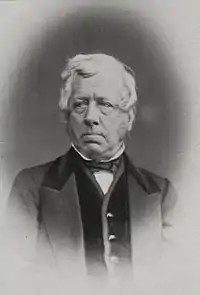 |
1848 | 17 April 1849 | Whig | |||
| Lord Seymour |  |
17 April 1849 | 1 August 1851 | Whig | |||
| As First Commissioner of Works | |||||||
| Lord Seymour |  |
1 August 1851 | 21 February 1852 | Whig | |||
| Lord John Manners | 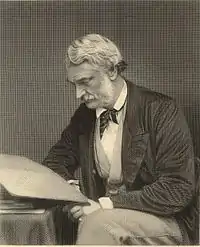 |
4 March 1852 | 17 December 1852 | Conservative | The Earl of Derby | ||
| Sir William Molesworth, Bt |  |
5 January 1853 | 14 October 1854 | Radical | The Earl of Aberdeen (Coalition) | ||
| President of the Board of Health | |||||||
| Sir Benjamin Hall, Bt |  |
14 October 1854 | 13 August 1855 | Whig | |||
| The Viscount Palmerston | |||||||
| William Cowper |  |
13 August 1855 | 9 February 1857 | Whig | |||
| William Monsell |  |
9 February 1857 | 24 September 1857 | Whig | |||
| William Cowper |  |
24 September 1857 | 21 February 1858 | Whig | |||
| Charles Adderley |  |
8 March 1858 | 1 September 1858 | Conservative | The Earl of Derby | ||
| Board of Health abolished in 1858; responsibilities transferred to the Privy Council (1858–1871), then the Local Government Board (1871–1919). | |||||||
Minister of Health (1919–1968) | |||||||
| Name | Portrait | Term of office | Political party | Prime Minister | |||
| Dr Christopher Addison | .jpg.webp) |
24 June 1919 | 1 April 1921 | Liberal | David Lloyd George (Coalition) | ||
| Sir Alfred Mond, Bt |  |
1 April 1921 | 19 October 1922 | Liberal | |||
| Sir Arthur Griffith-Boscawen |  |
24 October 1922 | 7 March 1923 (Lost seat 1922) |
Conservative | Bonar Law | ||
| Neville Chamberlain |  |
7 March 1923 | 27 August 1923 | Conservative | |||
| Stanley Baldwin | |||||||
| Sir William Joynson-Hicks, Bt | 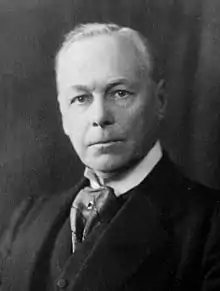 |
27 August 1923 | 22 January 1924 | Conservative | |||
| John Wheatley |  |
22 January 1924 | 3 November 1924 | Labour | Ramsay MacDonald | ||
| Neville Chamberlain |  |
6 November 1924 | 4 June 1929 | Conservative | Stanley Baldwin | ||
| Arthur Greenwood | 7 June 1929 | 24 August 1931 | Labour | Ramsay MacDonald | |||
| Neville Chamberlain |  |
25 August 1931 | 5 November 1931 | Conservative | Ramsay MacDonald (1st National Min.; 2nd National Min.) | ||
| Sir Hilton Young |  |
5 November 1931 | 7 June 1935 | Conservative | |||
| Sir Kingsley Wood |  |
7 June 1935 | 16 May 1938 | Conservative | Stanley Baldwin (3rd National Min.) | ||
| Neville Chamberlain (4th National Min.; War Coalition) | |||||||
| Dr Walter Elliot |  |
16 May 1938 | 13 May 1940 | Unionist | |||
| Malcolm MacDonald |  |
13 May 1940 | 8 February 1941 | National Labour | Winston Churchill (War Coalition; Caretaker Min.) | ||
| Ernest Brown |  |
8 February 1941 | 11 November 1943 | National Liberal | |||
| Henry Willink | 11 November 1943 | 26 July 1945 | Conservative | ||||
| Aneurin Bevan | .jpg.webp) |
3 August 1945 | 17 January 1951 | Labour | Clement Attlee | ||
| Hilary Marquand |  |
17 January 1951 | 26 October 1951 | Labour | |||
| Harry Crookshank |  |
30 October 1951 | 7 May 1952 | Conservative | Sir Winston Churchill | ||
| Iain Macleod |  |
7 May 1952 | 20 December 1955 | Conservative | |||
| Sir Anthony Eden | |||||||
| Robin Turton |  |
20 December 1955 | 16 January 1957 | Conservative | |||
| Dennis Vosper |  |
16 January 1957 | 17 September 1957 | Conservative | Harold Macmillan | ||
| Derek Walker-Smith |  |
17 September 1957 | 27 July 1960 | Conservative | |||
| Enoch Powell | 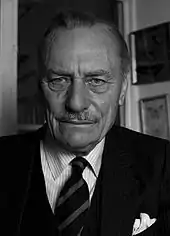 |
27 July 1960 | 20 October 1963 | Conservative | |||
| Anthony Barber |  |
20 October 1963 | 16 October 1964 | Conservative | Sir Alec Douglas-Home | ||
| Kenneth Robinson |  |
18 October 1964 | 1 November 1968 | Labour | Harold Wilson | ||
| Post merged with Ministry for Social Security in 1968. | |||||||
Secretary of State for Health and Social Services (1968–1988) | |||||||
| Name | Portrait | Term of office | Political party | Prime Minister | |||
| Richard Crossman |  |
1 November 1968 | 19 June 1970 | Labour | Harold Wilson | ||
| Sir Keith Joseph |  |
20 June 1970 | 4 March 1974 | Conservative | Edward Heath | ||
| Barbara Castle |  |
5 March 1974 | 8 April 1976 | Labour | Harold Wilson | ||
| David Ennals |  |
8 April 1976 | 4 May 1979 | Labour | James Callaghan | ||
| Patrick Jenkin |  |
5 May 1979 | 14 September 1981 | Conservative | Margaret Thatcher | ||
| Norman Fowler |  |
14 September 1981 | 13 June 1987 | Conservative | |||
| John Moore |  |
13 June 1987 | 25 July 1988 | Conservative | |||
| Post split into Secretary of State for Social Security and Secretary of State for Health in 1988. | |||||||
Secretary of State for Health (1988–2018) | |||||||
| Name | Portrait | Term of office | Political party | Prime Minister | |||
| Kenneth Clarke |  |
25 July 1988 | 2 November 1990 | Conservative | Margaret Thatcher | ||
| William Waldegrave |  |
2 November 1990 | 10 April 1992 | Conservative | |||
| John Major | |||||||
| Virginia Bottomley | 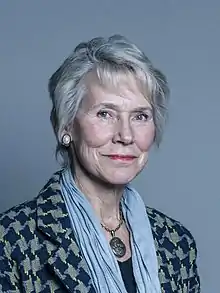 |
10 April 1992 | 5 July 1995 | Conservative | |||
| Stephen Dorrell | 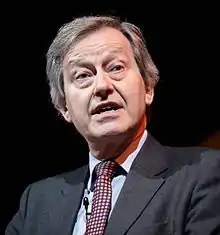 |
5 July 1995 | 2 May 1997 | Conservative | |||
| Frank Dobson |  |
3 May 1997 | 11 October 1999 | Labour | Tony Blair | ||
| Alan Milburn |  |
11 October 1999 | 13 June 2003 | Labour | |||
| John Reid |  |
13 June 2003 | 6 May 2005 | Labour | |||
| Patricia Hewitt |  |
6 May 2005 | 28 June 2007 | Labour | |||
| Alan Johnson | 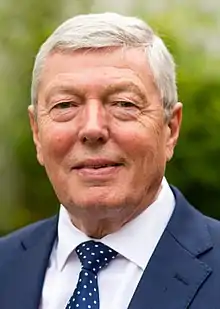 |
28 June 2007 | 5 June 2009 | Labour | Gordon Brown | ||
| Andy Burnham |  |
5 June 2009 | 11 May 2010 | Labour | |||
| Andrew Lansley |  |
11 May 2010 | 4 September 2012 | Conservative | David Cameron (Coalition) | ||
| Jeremy Hunt |  |
4 September 2012 | 8 January 2018 | Conservative | |||
| David Cameron (II) | |||||||
| Theresa May (I·II) | |||||||
Secretary of State for Health and Social Care (2018–present) | |||||||
| Name | Portrait | Term of office | Political party | Prime Minister | |||
| Jeremy Hunt |  |
8 January 2018 | 9 July 2018 | Conservative | Theresa May
(II) | ||
| Hunt's tenure | |||||||
| Matt Hancock |  |
9 July 2018 | Incumbent | Conservative | |||
| Boris Johnson | |||||||
References
- "A Minister of State for Social Care". Home Farm Trust (hft).
- "LIST OF MINISTERIAL RESPONSIBILITIES Including Executive Agencies and Non-Ministerial Departments" (PDF). https://assets.publishing.service.gov.uk. CABINET OFFICE. August 2020. External link in
|website=(help) - "Secretary of State for Health and Social Care - GOV.UK". www.gov.uk.
External links
| Wikimedia Commons has media related to Secretaries of State for Health of the United Kingdom. |
! colspan=2|Prime Minister
